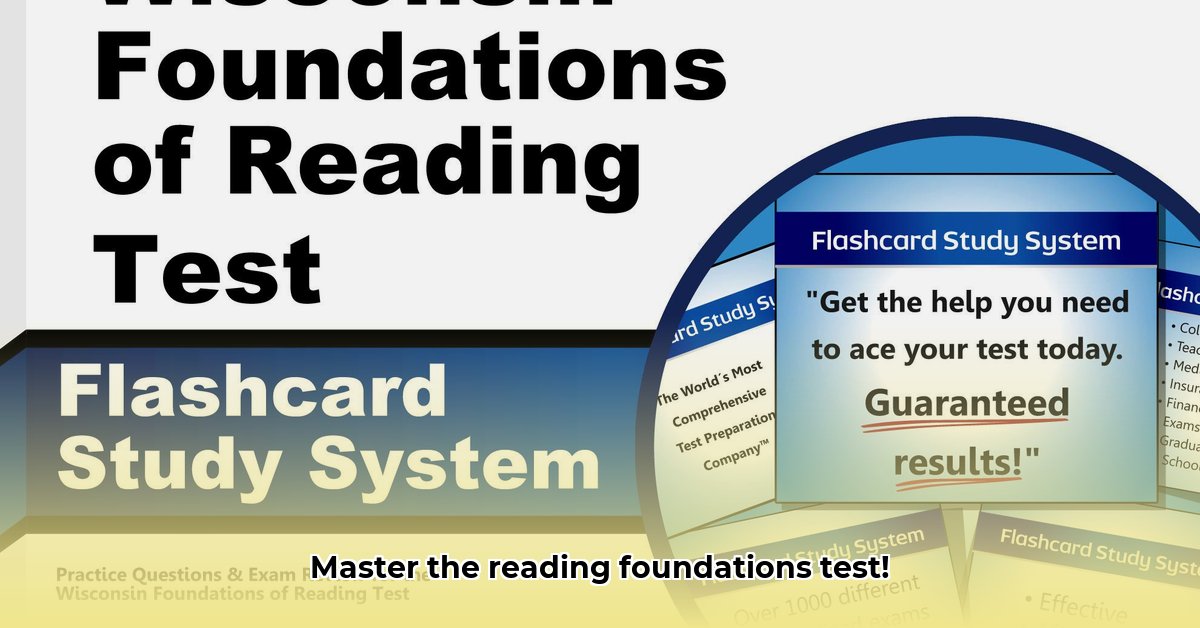# Foundations of Reading Exam: Your Comprehensive Prep Guide
Are you preparing for the Foundations of Reading exam (codes 090, 190, and 890)? This guide provides a clear path to success! We'll dissect each test code, emphasizing the science of reading to ensure you're well-prepared. From phonemic awareness and phonics to fluency, vocabulary, comprehension, and writing assignments, we'll provide clear explanations, examples, and strategies. You'll also learn valuable test-taking techniques, study methods, and how to find relevant practice materials. We'll clarify passing scores, fee waivers, and online proctoring specifics for your state. Let's equip you with the knowledge and confidence to excel and become an exceptional educator!
## Your Guide to Acing the Foundations of Reading Exam
This comprehensive guide is designed to help aspiring and current educators confidently pass the Foundations of Reading exam. We'll break down the exam's structure, provide effective study strategies, and navigate the state-specific requirements. Let's begin your journey to demonstrate reading competency!
### Understanding Test Codes: 090, 190, and 890
The Foundations of Reading exam may be listed under various test codes: 090, 190, or 890. These codes represent different versions of the exam, all focused on gauging your understanding of core reading concepts. While the foundational knowledge remains consistent, the depth and specific areas of emphasis may vary slightly. Consider 090 as the basic framework, with 190 and 890 expanding upon it, often with a stronger focus on the science of reading principles. Regardless of the specific code, a solid understanding of fundamental reading skills is key.
### Essential Content Areas: A Deep Dive
The Foundations of Reading exam assesses several crucial areas for effective reading instruction. Let's explore these areas in detail, emphasizing the science of reading:
* **Phonological Awareness:** This assesses your understanding of the sound structure of language. Expect questions on identifying rhyming words, segmenting words into syllables, and manipulating individual sounds (phonemes). Practice activities such as identifying rhymes or breaking down words like "ship" (sh-i-p).
* **Phonics:** This focuses on the relationship between letters and sounds. You'll be tested on letter-sound correspondences, decoding skills, and common spelling patterns. Developing understanding of the rules governing letter combinations and sound creation is essential.
* **Fluency:** This assesses your understanding of smooth and accurate reading. Expect questions about strategies to improve reading fluency, assessing fluency levels, and the importance of reading rate and accuracy. Understand how to support students in reading confidently and effortlessly.
* **Vocabulary:** A robust vocabulary is essential for reading comprehension. This section explores vocabulary development strategies, assessing vocabulary knowledge, and effective vocabulary instruction techniques at various grade levels. Focus on teaching word meanings and expanding vocabulary breadth.
* **Reading Comprehension:** This evaluates your ability to understand and interpret text. Expect questions on teaching comprehension strategies, analyzing text structures (narrative or informational), and assessing comprehension skills. Emphasize the "why" behind reading, not just the "what".
* **Written Assignments:** You'll likely need to write a short essay or response on a reading-related topic. Clear, articulate, and well-supported writing is essential. This demonstrates your understanding of reading theory and ability to communicate effectively.
These content areas are rooted in the science of reading, a research-backed literacy approach. A strong grasp of the science of reading will significantly increase your confidence and performance, offering practical instructional strategies.
### Strategies for Exam Success: Proven Methods
Preparing for the Foundations of Reading exam requires a strategic, sustained effort. Consider these effective preparation methods:
1. **Targeted Practice:** Focus on areas where you feel less confident. Use textbooks, online resources, and practice tests to diagnose and address your weaknesses.
2. **Consistent Practice:** Familiarize yourself with the exam's question types and pacing. Utilize sample questions and full-length practice tests.
3. **Time Management:** Practice answering questions under timed conditions. Effective time management is critical during the actual exam.
4. **Seek Feedback:** Request a colleague to review your practice responses. Constructive feedback will help you refine your approach.
5. **State-Specific Requirements:** Passing scores and fee waivers vary by state. Review your state's guidelines well in advance.
### Mastering the Online Proctoring Process
Many Foundations of Reading exams are now administered online, offering flexibility but presenting potential technical challenges. Ensure a reliable internet connection, a quiet testing environment, and familiarity with the proctoring software's requirements. Address any technical issues before test day to minimize stress and anxiety.
### State-Specific Information: Key Considerations
Exam requirements vary significantly by state. The following table provides illustrative examples and may not reflect the current requirements in any specific location. Always consult official state resources for the most up-to-date information.
| State | Passing Score (Example) | Fee Waiver Information (Example) |
|------------|-------------------------|------------------------------------|
| Arizona | Consult State Website | Consult State Website |
| California | Consult State Website | Consult State Website |
| Texas | Consult State Website | Consult State Website |
| Massachusetts| 240 | Check State Website |
| Utah | 247 | Check State Website |
### Conclusion: Empowering Your Success
The Foundations of Reading exam is a significant step, but thorough preparation and a strategic approach significantly increase your chances of passing. Focus on core concepts, practice consistently, and adhere to state-specific guidelines. Best of luck!
## Ace the NES Inc. Foundations of Reading Test 890
**Key Actionable Insights:**
* Mastering the science of reading is paramount for exam success.
* Practice tests are invaluable tools for assessing strengths and weaknesses.
* A well-structured study plan focused on addressing weaknesses is indispensable.
* Familiarity with the test format and question types is crucial.
* Utilizing varied study resources enhances comprehension and retention.
* Effective test-taking strategies significantly improve performance.
### Understanding the Exam
The NES Foundations of Reading (890) exam evaluates your knowledge of effective reading instruction principles and practices. While challenging, success is achievable with focused preparation. Think of it as a sustained effort that requires consistent dedication. The exam assesses your proficiency in phonological awareness, phonics, fluency, vocabulary, reading comprehension, and written communication skills. How confident are you in each area? Accurate self-assessment is the initial step toward achieving your teaching license.
### Content Areas and the Science of Reading: Detailed Breakdown
The exam is grounded in the science of reading, emphasizing a research-driven understanding of how children acquire reading skills. This goes beyond rote memorization, focusing on applying theoretical knowledge to practical scenarios:
* **Phonological Awareness:** The ability to recognize and manipulate sounds in spoken language. Expect questions pertaining to rhyming, syllable blending, and phoneme segmentation.
* **Phonics:** The relationship between letters and sounds, including letter-sound correspondence, decoding, and encoding.
* **Fluency:** Accurate, expressive, and effortless reading. Practice reading aloud and analyzing various fluency-building strategies.
* **Vocabulary:** Understanding the meaning of words. Review vocabulary acquisition techniques and morphology.
* **Reading Comprehension:** The ability to understand and derive meaning from text. Prepare for questions on inferencing, summarizing, and analyzing different text structures.
* **Written Assignments:** This section assesses your ability to evaluate student writing and provide effective feedback.
### Strategies for Success: A Step-by-Step Guide
Effective preparation is crucial for success. Avoid passive studying; actively engage with the material:
* **Diagnostic Assessment:** Begin with a practice test to identify areas of weakness. This will enable you to focus your study efforts effectively.
* **Targeted Study:** Utilize resources tailored to the NES exam, concentrating on areas identified as needing improvement.
* **Simulated Practice:** Take multiple practice tests to simulate the exam environment. Time yourself to improve both speed and accuracy. Review each practice test to reinforce learning and identify areas for further study.
* **Active Recall:** Regularly test yourself on the material. This will help solidify your understanding. Go beyond rereading; actively recall concepts and answer sample questions without referring to your notes.
* **Deep Dive into Key Terms:** Create flashcards, use mnemonic devices, and write out definitions in your own words.
* **Focus on the "Why" Not Just the "What":** Understand the underlying principles behind each concept.
* **Connect Theory to Practice:** Think about how you would apply these concepts in real-world classroom settings.
* **Collaborate With Peers:** Study groups can be invaluable for sharing knowledge and clarifying concepts.
* **Stay Positive and Manage Stress:** A positive mindset and effective stress management techniques are essential for optimal performance.
Latest posts by Lola Sofia (see all)
- Uncover Ancient Arcadia: Myths, Power, and Geography - August 12, 2025
- Explore Ancient Olympia’s Map: Unveiling 2,500 Years of History - August 12, 2025
- Discover Ancient Greece’s Islands: A Timeless Journey Through History and Myth - August 12, 2025
















